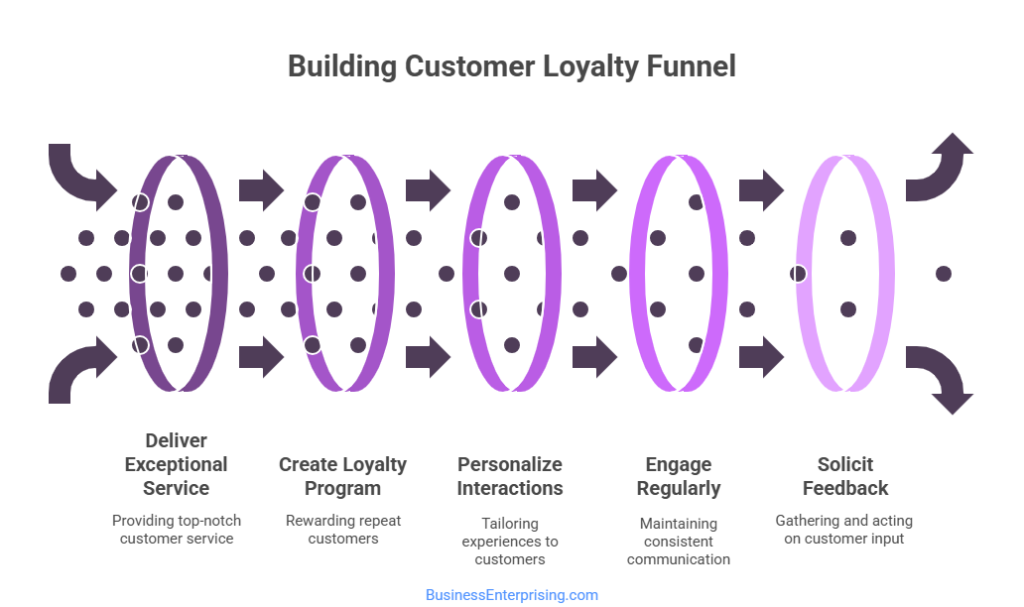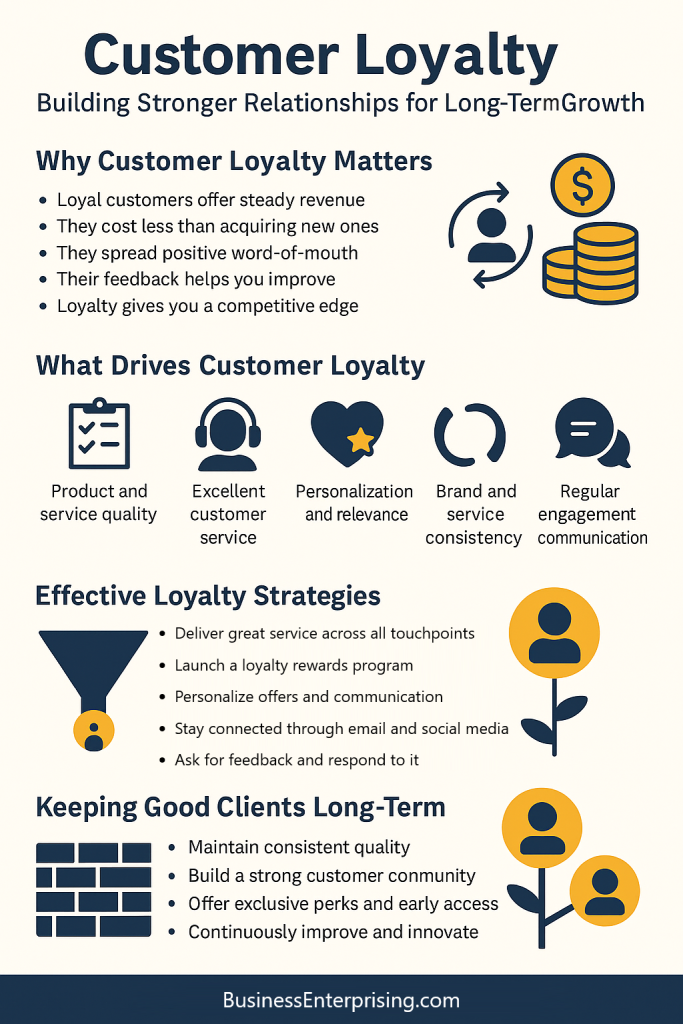
The Importance of Customer Loyalty
Stable Revenue Stream: All things considered, loyal customers generate consistent revenue. They are more likely to make repeat purchases and spend more overtime, providing financial stability for the business.
Cost Efficiency: Acquiring new customers is significantly more expensive than retaining existing ones. Another key point is that loyal customers reduce the need for extensive marketing campaigns aimed at attracting new customers.
Positive Word-of-Mouth: Additionally, satisfied, loyal customers often share their positive experiences with friends and family, acting as unpaid brand advocates. This organic promotion is invaluable for building brand reputation as well as attracting new customers.
Feedback and Improvement: Loyal customers are more likely to provide constructive feedback. Their insights can help businesses improve products, services, as well as customer experiences.
Competitive Advantage: In a market filled with choices, customer loyalty can be a key differentiator. A loyal customer base provides a competitive edge, making it harder for competitors to lure customers away.
Factors Influencing Customer Loyalty
Several factors contribute to building client loyalty:
Quality of Products and Services: Consistently delivering high-quality products and services is fundamental. Customers expect value for their money, and meeting or exceeding their expectations is crucial for loyalty.
Customer Service: Exceptional customer service plays a vital role in fostering loyalty. Prompt, courteous, and effective service can turn a one-time buyer into a repeat customer.
Personalization: Personalizing the customer experience shows that a business values its customers. Tailoring communications, offers, and recommendations based on customer preferences enhances their connection to the brand.
Consistency: Consistency in product quality, service, and brand messaging builds trust. Customers are more likely to remain loyal to brands that consistently meet their expectations.
Engagement and Communication: Regular engagement with customers through various channels (i.e., email, social media, newsletters) keeps the brand top-of-mind and strengthens the customer relationship.
Strategies for Keeping Customers Loyal
To build and maintain customer loyalty, businesses should implement the following strategies with consistency and intention.
First, deliver exceptional customer service. Train your staff to provide excellent service at every touchpoint. Additionally, empower employees to resolve issues promptly and exceed customer expectations. As a result, satisfied customers are more likely to return and recommend your business to others.
Next, create a loyalty program that rewards repeat customers. For example, offer points, discounts, exclusive offers, or special privileges to encourage ongoing purchases. When implemented effectively, a well-structured loyalty program can significantly improve customer retention.
Moreover, personalize customer interactions whenever possible. Use available data to tailor experiences and offers. For instance, address customers by name, recommend products based on past purchases, and send personalized messages for birthdays or anniversaries. By doing so, you show customers that you value them as individuals.
In addition, engage regularly across multiple channels. Maintain communication through email newsletters, social media updates, and personalized messages. Share valuable content, highlight new products, and promote exclusive offers to keep your audience informed and involved.
Finally, solicit and act on customer feedback. Encourage customers to share their thoughts on their experiences. Then, use this feedback to identify areas for improvement. When customers see that their input drives positive change, they feel appreciated and more loyal to your brand.
Keeping Good Clients
Provide Consistent Quality: Ensure that your products and services consistently meet or exceed customer expectations. Quality should be a non-negotiable aspect of your business, as it directly impacts customer satisfaction and loyalty.
Build a Strong Brand Community: Foster a sense of community around your brand. Create online forums, social media groups, or local events where customers can connect with each other and with your brand. A strong community can also enhance loyalty and encourage customers to advocate for your brand.
Offer Exclusive Benefits: Provide exclusive benefits to loyal customers, such as early access to new products, special discounts, or VIP customer support. Exclusive benefits make customers feel valued and appreciated.
Be Transparent and Honest: Transparency and honesty are key to building trust. Be open about your business practices, policies, and any changes that may affect customers. If mistakes happen, acknowledge them and also take corrective action promptly.
Continuously Innovate: Finally, stay ahead of the competition by continuously innovating and improving your products and services. Keeping your offerings fresh and relevant shows customers that you are committed to meeting their evolving needs.
Maintaining customer loyalty is an ongoing process that requires dedication, consistency, and a customer-centric approach. By delivering exceptional customer service, personalizing interactions, engaging regularly, and providing consistent quality, businesses can build strong, lasting relationships with their customers. Implementing a loyalty program, soliciting feedback, building a community, offering exclusive benefits, and maintaining transparency further enhance customer loyalty.
In today’s competitive market, customer loyalty is a key differentiator that can drive sustainable growth and success. By prioritizing customer satisfaction and continuously striving to exceed expectations, businesses can cultivate a loyal customer base that supports long-term success. Loyal customers not only contribute to stable revenue but also act as brand ambassadors, helping to attract new customers and build a strong brand reputation.


